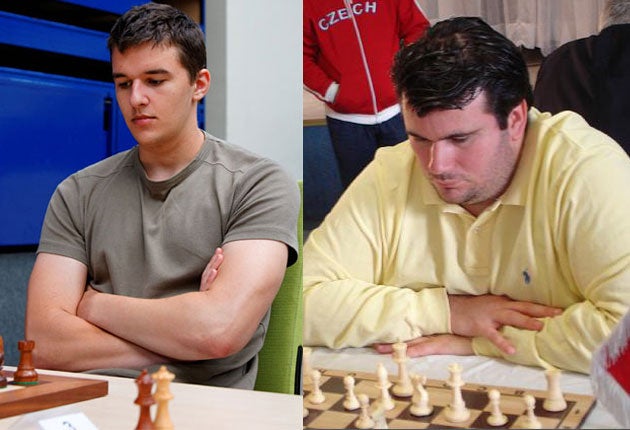White knights catch French grandmasters cheating by text

Your support helps us to tell the story
From reproductive rights to climate change to Big Tech, The Independent is on the ground when the story is developing. Whether it's investigating the financials of Elon Musk's pro-Trump PAC or producing our latest documentary, 'The A Word', which shines a light on the American women fighting for reproductive rights, we know how important it is to parse out the facts from the messaging.
At such a critical moment in US history, we need reporters on the ground. Your donation allows us to keep sending journalists to speak to both sides of the story.
The Independent is trusted by Americans across the entire political spectrum. And unlike many other quality news outlets, we choose not to lock Americans out of our reporting and analysis with paywalls. We believe quality journalism should be available to everyone, paid for by those who can afford it.
Your support makes all the difference.The tranquil world of international chess has been thrown into uproar by accusations of intricate "cheating by text message" against three senior French players.
Two grandmasters and an international master have been found guilty by their own national organisation of "violating sporting ethics" at the Chess Olympiad – world team championships – in Khanty-Mansiysk Siberia in September.
The trio, who deny the charges, were accused of devising an elaborate scheme – using text messages and choreographed movements around the competition hall – to convey advice from a computer programme while matches were in progress.
One of the suspect games occurred in a match between England and France, in which the young French international grandmaster, Sébastien Feller, 19, beat David Howell, then also 19, the youngest chess grandmaster in the UK. Another occurred in a match between France and Georgia.
Two of the accused men, Mr Feller and Cyril Marzolo, 32, have been suspended from competition for two years. The third, the team captain Arnaud Hauchard, 39, – accused of conveying pre-arranged codes for moves by his own movements between tables – has been removed from his position. All three men deny the allegations, which seem certain to end in the courts.
This is the first time that formal accusations of cheating of this kind have surfaced in international chess. "There have often been suspicions but there has never before been such clear evidence of cheating at the highest level," said Laurent Verat, director general of the Fédération Française des Echecs.
Mr Verat said: "Even Garry Kasparov (the former world champion) has rung me about it. He is astounded."
The affair has split the country's best players down the middle – into the allegedly dishonest and, inevitably, black and the outraged, pure whites. Three other members of the team at the Olympiad – Maxime Vachier-Lagrave, Laurent Fressinet and Romain Edouard – have given public backing to the allegations against their team-mates.
The three accused men claim they are the victims of a conspiracy and internal team "jealousies".
Mr Marzolo was not in the team at the Olympiad. It is alleged he followed games on the internet from Nancy in eastern France. According to evidence given to the federation's disciplinary committee he fed the moves into Firebird, a powerful chess computer program.
Using pre-arranged numerical codes, he allegedly sent Firebird's recommended next moves to Mr Feller or Mr Hauchard in text messages which looked innocently like French mobile telephone numbers. Mr Hauchard allegedly conveyed the moves to Mr Feller while games were in progress, by moving between tables in the competition hall.
The tables, it is alleged, had been given pre-arranged codes equivalent to the standard notation of the 64 squares on a chess board between A1 and H8. If Mr Hauchard stood beside table B3 and moved to, say, table B4, Mr Feller knew that the computer recommended that he move a piece from B3 to B4.
The alleged manipulations came to light because Mr Marzolo did not have a mobile telephone of his own. As a result of financial problems he had been barred by all mobile companies. His telephone had been loaned to him by another senior player for whom he once worked, Joanna Pomian, the vice president of the federation.
During the championship, she accidentally discovered a message from Mr Hauchard in Russia which read: "Hurry up and send the moves." She checked the records of the line and found Mr Marzolo had sent 180 messages to the other accused men during the competition. Most consisted of telephone numbers.
Investigations revealed that the third and fourth digits corresponded with the sequence numbers of recommended moves and the fifth to the eighth digits were coded references to squares on the chess board.
Not so fair players
* Major Charles Ingram and former college lecturer Tecwen Whittock were convicted in 2003 of conspiracy to cheat TV quiz programme Who Wants to Be a Millionaire? out of £1m. Whittock, who sat in the audience, coughed to signal the correct responses to Ingram, who sat in the hot seat.
* In 2007, Yau Yiv Lam made around £250,000 by using spy equipment to cheat at poker in six London casinos. A mini-camera hidden up his sleeve filmed cards as they were dealt and relayed the footage to an accomplice sitting in a nearby van. The accomplice then radioed card details to a third cheat sitting at the poker table with Lam, who profited from the set-up. The player's never-ending luck prompted casino bosses to raise the alarm and the trio were later jailed for nine months.
Join our commenting forum
Join thought-provoking conversations, follow other Independent readers and see their replies
Comments